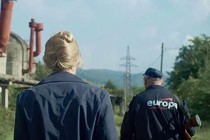SARAJEVO 2023 Documentary Competition
Review: Requiem to the Hot Days of Summer
- Giorgi Parkosadze’s debut feature is a slice-of-life documentary set in the Georgian mountains, but there’s plenty of room for more audacity

A small village in Georgia as remote from urban civilisation as it gets, an elderly mother and a young-ish son, and their summer routine of farming, milking and cheese making: all of this amounts to promising subject matter for a debut documentary feature. Giorgi Parkosadze’s aptly titled Requiem to the Hot Days of Summer, screening in the Documentary Competition at Sarajevo, captures the poeticism latent in the simple act of observation, as Parkosadze spent years with two people and a camera, tucked away between Georgia’s mountainous peaks. Summer is when Guri and his mother, Sanata, work the land and tend the cattle, when they make cheese and sell it in the city, while winters are still and frosty – they can only be waited out.
With a contemplative gaze that nonetheless never neglects the hardships inherent in a rural way of life with no electricity or transport, Parkosadze strives to represent his subjects in silence and in solitude. As a result, there are moments of inspiring intimacy captured on screen, where the framing and sound become superfluous devices, and life spills out of the screen, a small miracle of shared solitude. The film is born of the filmmaker’s own desire to reconnect with a chronotope of village life that he, being born and bred in a city, never got to experience himself. Unsurprisingly, Requiem to the Hot Days of Summer wears its heart on its sleeve: through the aesthetics of contemplation, silence and a fly-on-the-wall documentary approach, one feels a sincere desire to connect with what’s in front of the camera.
However, this otherwise fruitful formula can sometimes betray its subjects and trap them in a metaphorical glass jar, to be inspected from an unbridgeable distance. It’s almost like Parkosadze revered his subjects way too much, and this prevents him from telling a story. There’s a rather nebulous idea behind the charming prose used to describe the film in the festival catalogue as a “reminiscence of a blissful way of life, which is still present in the unconscious memory of humanity”, and in reality, this poeticism ends up being an empty promise for most of the film. Parkosadze shot and edited the doc himself, but his good intentions during a process which took him around seven years seem to have hit a brick wall when it comes to striking the fine balance between telling a compelling story and venerating its subjects.
At times, Requiem… tries a bit too hard to fill in the gaps between seasons, events and timelines with seamless, yet mystical, transitions, which means it misses the opportunity to focus on the non-events (from an urban point of view) that form the film’s emotional epicentre. Sitting with silence, with nature, with a mother and son who barely speak because they don’t need to – all of these moments can be taken as a starting point to transform the contemplative visual style from within. There’s a boldness to embracing repetitions and routine as part of village life in a slim 77-minute running time, but Requiem… leaves plenty of room for more of this audacity.
Requiem to the Hot Days of Summer was produced by Georgia’s Attic Production and co-produced by Greece’s Filmografik Productions.
Did you enjoy reading this article? Please subscribe to our newsletter to receive more stories like this directly in your inbox.




















